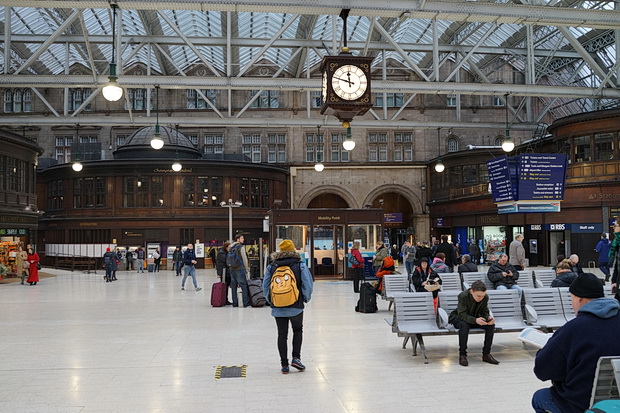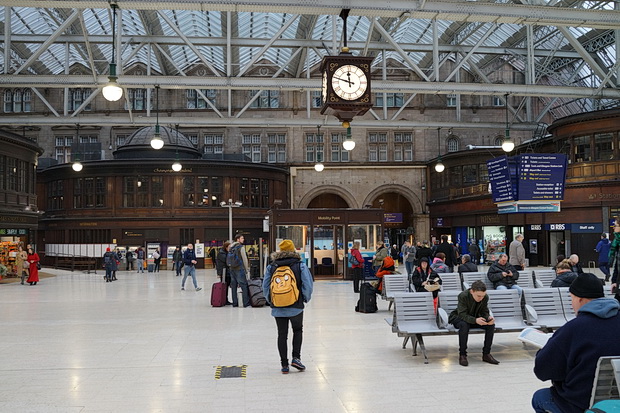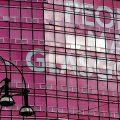
Since I’ve been fortunate to rejoin The Monochrome Set, I’ve had the opportunity to travel around the UK a lot more and, of course, I’ve been taking my camera with me.
Although being in a band means you don’t get so much time to yourself – as soon as you arrive somewhere you have to set up for the soundcheck, eat, get changed and then prepare for the gig – so these are just a few snapshots I captured as I ran about.
Glasgow Central is an absolute cracker of a station with loads of its original features intact, including several Edwardian-era wooden structures.
Opened by the Caledonian Railway on 31 July 1879, it forms the northern terminus of the West Coast Main Line from London Euston, and for inter-city services between Glasgow and England.
With nearly 29 million passengers in 2014-15, Glasgow Central is the eleventh-busiest railway station in Britain and is is protected as a category A listed building.
The station was rebuilt between 1901-1905 and substantially extended.
The station is noted for the large glass-walled bridge that takes the platforms over Argyle Street, nicknamed as the “Hielanman’s Umbrella” (Highlandman’s Umbrella) because it was used as a gathering place for visiting Highlanders.
View on Clyde Street.
Looking along the Clyde.
Rail bridge across the Clyde.
A. Gardner & Son’s striking warehouse in Jamaica Street was seen as fantastically modern when it was erected in the 1850s. With steel members supporting both the internal and external walls, the building has huge windows, all the better for showing off the shop’s cabinets and upholstery.
Designed by John Baird, its iron and glass construction was inspired by Joseph Paxton’s Crystal Palace, the centrepiece of the Great Exhibition of 1851. Part of the pub is now in use as a Wetherspoons pub called The Crystal Palace.
Built in 1863 to a design by John Honeyman, Lansdowne Parish Church in Glasgow features a 218 feet spire, one of the slimmest in Europe.
With its tall buildings and grid road structure, Glasgow has something of a New York feel about it, and perhaps that is reflected in the work of one of their finest bands, The Blue Nile.
I loved the place.
Another fine building hosting a Wetherspoons pub, the large clock on the corner bears the name Scottish Legal Life Assurance Society.
Over the hillside…
Art Nouveau Peacock on Princes Square Shopping Center in Buchanan Street, created in 1985.
You’ll hear quite a few of these around Glasgow, but there’s even more in Edinburgh.
Glasgow at dusk.
Hutchesons’ Hall, said to be one of Glasgow’s finest and most elegant buildings was completed in 1805, with a major refurbishment taking place within the building to the designs of John Baird II in 1876.
Purchased by The National Trust for Scotland in 1984, water damage in 2008 left the building empty until it was reopened in the summer of June 2014 as a restaurant.
Glasgow’s City Chambers at night. Constructed between 1882 and 1888 to a competition winning design by Scottish architect William Young, a native of Paisley, the building was inaugurated in August 1888 by Queen Victoria.
The traditional ‘traffic cone on top of statue.’ Always a pleasing sight, in my eyes,
Glasgow once had over 300 ‘Tardis’ police boxes, but by 1994 just 10 remained, a mix of the traditional blue and the odd Glasgow-specific red boxes. This number has fallen to just four, with all of them now classed as category B-listed buildings. [—]
The band were playing Stereo in Glasgow, a lovely venue with a vegan/cafe bar upstairs.
Now a category A listed building, the Pavilion Theatre of Varieties is one of Glasgow’s oldest theatres, opening on 29 February 1904 as a music hall.
St George’s Tron Church.
After the gig we repaired to the Horseshoe pub in Drury Street. At 104 feet and three inches, its curved Victorian bar claims to be the longest in Europe and enjoys an architectural listing.
Established in 1884 by Cavalry Captain John Scouller, the bar was a prime example of a ‘Victorian Gin Palace,’ with John Young Whyte extending the bar when he took over in the 1900s.
Famous drinkers in the past have included quaffer extraordinaire, Oliver Reid, Billy Connolly and Scottish band Travis, who presented the pub with their gold disc for the album ‘The Man Who…’ as well as their Q Award and Brit Awards.
Pub detail.
The striking glasswork of Mac Sorley’s Music Bar on Jamaica Street.
Street art by Sam Bates AKA Smug on the five pillars supporting the Caledonian Railway Bridge on Broomielaw.
Heading back to the station
Old and new on Oswald Street.


